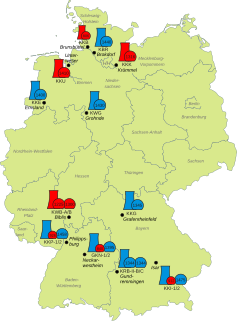
The International Atomic Energy Agency (IAEA) is an international organization that seeks to promote the peaceful use of nuclear energy, and to inhibit its use for any military purpose, including nuclear weapons. The IAEA was established as an autonomous organisation on 29 July 1957. Though established independently of the United Nations through its own international treaty, the IAEA Statute, the IAEA reports to both the United Nations General Assembly and Security Council.

The Treaty on the Non-Proliferation of Nuclear Weapons, commonly known as the Non-Proliferation Treaty or NPT, is an international treaty whose objective is to prevent the spread of nuclear weapons and weapons technology, to promote cooperation in the peaceful uses of nuclear energy, and to further the goal of achieving nuclear disarmament and general and complete disarmament. Between 1965 and 1968, the treaty was negotiated by the Eighteen Nation Committee on Disarmament, a United Nations-sponsored organization based in Geneva, Switzerland.

Nuclear proliferation is the spread of nuclear weapons, fissionable material, and weapons-applicable nuclear technology and information to nations not recognized as "Nuclear Weapon States" by the Treaty on the Non-Proliferation of Nuclear Weapons, commonly known as the Non-Proliferation Treaty or NPT. Proliferation has been opposed by many nations with and without nuclear weapons, as governments fear that more countries with nuclear weapons will increase the possibility of nuclear warfare, de-stabilize international or regional relations, or infringe upon the national sovereignty of states.

Mohamed Mustafa ElBaradei is an Egyptian law scholar and diplomat who served as Vice-President of Egypt on an interim basis from 14 July 2013 until his resignation on 14 August 2013.
The nuclear program of Iran has included several research sites, two uranium mines, a research reactor, and uranium processing facilities that include three known uranium enrichment plants. In 1970, Iran ratified the Non-Proliferation Treaty (NPT), making its nuclear program subject to the IAEA's verification.

Iran is not known to currently possess weapons of mass destruction (WMD) and has signed treaties repudiating the possession of WMDs including the Biological Weapons Convention, the Chemical Weapons Convention, and the Non-Proliferation Treaty (NPT). Iran has first-hand knowledge of WMD effects—over 100,000 Iranian troops and civilians were victims of chemical weapons during the 1980s Iran–Iraq War.

Nuclear energy policy is a national and international policy concerning some or all aspects of nuclear energy and the nuclear fuel cycle, such as uranium mining, ore concentration, conversion, enrichment for nuclear fuel, generating electricity by nuclear power, storing and reprocessing spent nuclear fuel, and disposal of radioactive waste.
Operation Opera, also known as Operation Babylon, was a surprise Israeli air strike carried out on 7 June 1981, which destroyed an Iraqi nuclear reactor under construction 17 kilometers southeast of Baghdad. The operation came after Iran's unsuccessful Operation Scorch Sword operation had caused minor damage to the same nuclear facility the previous year, the damage having been subsequently repaired by French technicians. Operation Opera, and related Israeli government statements following it, established the Begin Doctrine, which explicitly stated the strike was not an anomaly, but instead "a precedent for every future government in Israel". Israel's counter-proliferation preventive strike added another dimension to their existing policy of deliberate ambiguity, as it related to the nuclear capability of other states in the region.

United Nations Security Council resolution 825, adopted on 11 May 1993, called upon the Democratic People's Republic of Korea to reconsider its decision to withdraw from the Nuclear Non-Proliferation Treaty and allow weapons inspectors from the International Atomic Energy Agency (IAEA) into the country, after it had previously refused entry.
This is the timeline of the nuclear program of Iran.

United Nations Security Council resolution 1540 was adopted unanimously on 28 April 2004 regarding the non-proliferation of weapons of mass destruction. The resolution establishes the obligations under Chapter VII of the United Nations Charter for all Member States to develop and enforce appropriate legal and regulatory measures against the proliferation of chemical, biological, radiological, and nuclear weapons and their means of delivery, in particular, to prevent the spread of weapons of mass destruction to non-state actors.

Yukiya Amano was a Japanese diplomat and the Director General of the International Atomic Energy Agency (IAEA). Amano previously served as an international civil servant for the United Nations and its subdivisions. On 22 July 2019, IAEA announced that Amano had died.
The International Luxembourg Forum on Preventing Nuclear Catastrophe — is an international non-governmental organisation uniting leading world-renowned experts on non-proliferation of nuclear weapons, materials and delivery vehicles.

Iran convened a conference titled "International Disarmament and Non-proliferation: World Security without Weapons of Mass Destruction" on 17 and 18 April 2010 in Tehran. The theme of the conference was Nuclear Energy for All, Nuclear Weapons for No One.
Views on the nuclear program of Iran vary greatly, as the nuclear program of Iran is a very contentious geopolitical issue. Uriel Abulof identifies five possible rationales behind Iran’s nuclear policy: (i) Economy, mainly energy needs; (ii) Identity politics, pride and prestige; (iii) Deterrence of foreign intervention; (iv) Compellence to boost regional influence; and (v) Domestic politics, mitigating, through ‘nuclear diversion’ the regime’s domestic crisis of legitimacy. Below are considerations of the Iranian nuclear program from various perspectives.

The Joint Comprehensive Plan of Action, known commonly as the Iran nuclear deal or Iran deal, is an agreement on the Iranian nuclear program reached in Vienna on July 14, 2015, between Iran and the P5+1 together with the European Union.
AMAD Project refers to an Iranian scientific project, started in 1989 and stopped in 2003 according to IAEA, that is suspected by Israel to have nonetheless continued, with the aim of developing nuclear weapons. Iran have denied the existence of any program aimed at the development of a nuclear explosive device, and in particular denied the existence of the AMAD Plan in when reporting additional details to IAEA in 2015.









